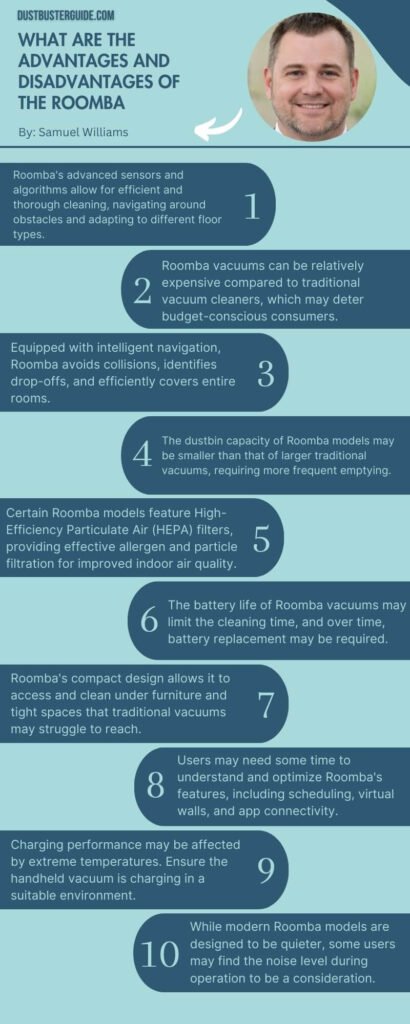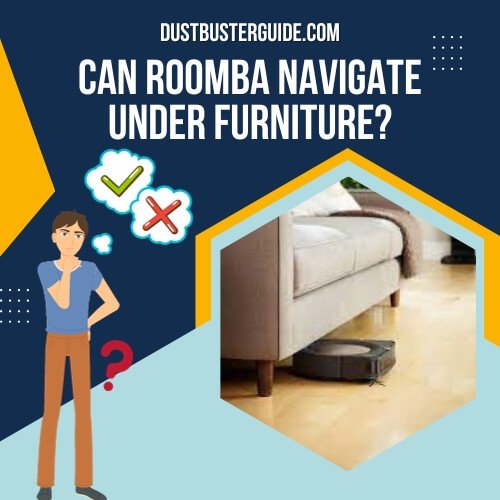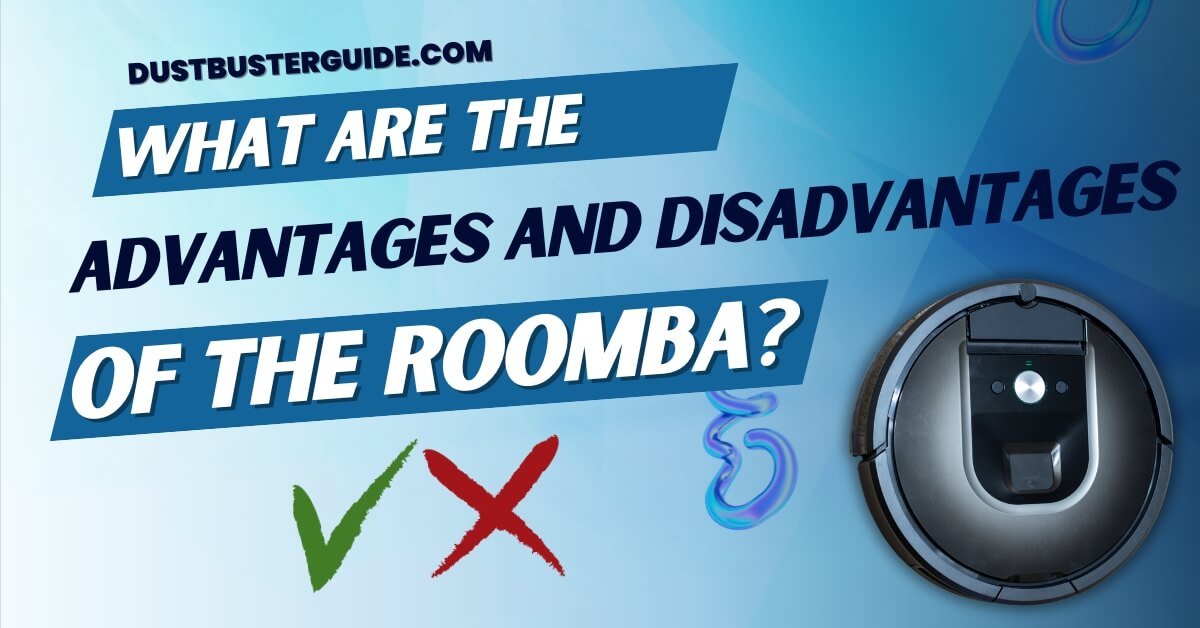Roomba, a renowned name in the world of robot vacuum cleaners, comes with its own set of advantages and disadvantages that significantly influence purchasing decisions. What are the advantages and disadvantages of the Roomba is a question that delves into the merits and limitations of Roomba models.
In just a couple of lines, the answer unfolds like a robotic saga: Roombas excel in convenience, automation, and efficiency, but they may struggle with certain obstacles and require maintenance. Join us on this exploration to weigh the advantages and disadvantages of inviting a Roomba into your cleaning brigade.
What Are The Advantages And Disadvantages Of The Roomba – Explained
The Roomba robotic vacuum cleaner offers convenience through autonomous cleaning, saving time and effort. Its efficient navigation technology ensures effective cleaning while its customization options allow for scheduled or targeted cleaning. Minimal maintenance and the ability to handle pet hair make it user-friendly.
However, it comes with an initial cost, may have limitations in very large areas, and requires occasional maintenance and parts replacement.
Strap in, because we’re about to embark on an informative journey, unearthing everything there is to know about the advantages and disadvantages of the Roomba. So let’s find out below.

Convenience Of Automatic Cleaning
There’s no denying the sheer convenience of automatic cleaning that a Roomba brings to your home. Picture this: You’re rushing out the door for work, and you remember that you forgot to vacuum. With a quick tap on your smartphone, your Roomba springs into action, effortlessly cleaning your floors while you’re out.
There’s no need to worry about finding the time to vacuum or even being at home to do it. Roomba takes care of all the hard work for you. And, it’s not just about the convenience of scheduling. Roomba’s intelligent navigation system means it can navigate around furniture, under beds, and other hard-to-reach places, ensuring a thorough clean every time.
With its ability to return to its docking station to recharge, the Roomba can handle even large homes with ease. You’ll return home to find your floors spotlessly clean – all without lifting a finger. This level of convenience is a major advantage that the Roomba offers, making it an excellent investment for those with busy lifestyles.
Smart Home Integration
Integrating with your smart home setup is one of the coolest perks that a robotic vacuum cleaner offers. Roomba, a popular brand of autonomous vacuum cleaners, stands out in this regard. With Roomba, you can sync the device with your smart home systems like Amazon Alexa or Google Home, allowing you to control your cleaning routines through voice commands.
Imagine simply telling your Roomba to start cleaning as you relax on your couch or are busy cooking in the kitchen. It’s not just about convenience, it’s about a smarter and more efficient lifestyle.
Moreover, Roomba’s Wi-Fi connectivity allows it to be controlled remotely through a smartphone app. This means that you can start, pause, or schedule cleaning sessions even when you’re not at home. No need to worry if you forgot to run the vacuum before leaving for work, you can just open the app and start the cleaning process with a tap of your finger.
This integration with smart home systems and mobile devices is a significant advantage, making Roomba a truly modern, tech-friendly cleaning solution.
Cleaning Performance
But let’s not forget about the most important aspect of a robotic vacuum cleaner – its cleaning performance. Roombas are designed with a comprehensive three-stage cleaning system.
This system loosens, lifts, and suctions dirt, dust, and hair from your floors. Not only this, Roombas are equipped with multi-surface brushes that work together to grab debris from your carpet and hard floors effectively. They can even detect areas that are dirtier and spend more time cleaning those particular spots.

Another advantage of the Roomba is its ability to navigate under furniture and into tight spaces where a traditional vacuum cleaner may struggle to reach. Plus, with their automatic dirt disposal feature, they can empty their dustbin into a disposable bag, allowing for weeks of cleaning without needing your attention. However, the cleaning performance can vary between different Roomba models. Below is a quick overview of the cleaning performance of some popular Roomba models:
| Roomba Model | Dust Capacity | Notable Cleaning Features |
| Roomba 675 | 0.6 L | Dirt Detect Technology, Adaptive Navigation |
| Roomba i7 | 0.5 L | Imprint Smart Mapping, Automatic Dirt Disposal |
| Roomba s9 | 0.4 L | Superior 3-stage cleaning system, Anti-Allergen Technology |
As you can see, each model offers unique features that aid in the cleaning performance. So, when choosing a Roomba, you should consider your specific cleaning needs and preferences.
Navigation And Obstacle Detection
Imagine the convenience of a device that can effortlessly glide around your home, avoiding obstacles and mapping out the most efficient cleaning path. That’s what you can expect from a Roomba. Equipped with advanced navigation and obstacle detection technology, the Roomba can navigate around furniture, stairs, and other obstructions with ease.
This impressive piece of tech uses sensors to avoid collisions and drops, ensuring your Roomba can move around your home safely and efficiently. The Roomba’s navigation system also allows it to remember the layout of your house, ensuring a thorough clean every time. It’s able to detect high-traffic areas and gives those spots extra attention.
However, it’s worth noting that the Roomba may struggle with very dark-colored floors or carpets, as the sensors may interpret this as a drop. Also, while the Roomba is generally good at detecting and avoiding obstacles, it may occasionally get stuck on items like clothes or cords. So, while it’s a marvel of modern technology, it’s always best to keep your floor clear of clutter for the most effective cleaning.
Maintenance And Upkeep
Keeping your robotic vacuum in top shape is a breeze, requiring only regular light maintenance to ensure it’s always ready for its next cleaning mission. For the Roomba, this involves periodically emptying the dust bin, cleaning the filter, and checking for any obstructions in the brushes or wheels.
Unlike traditional vacuums, there are no bags to replace, making it a more environmentally friendly option. Plus, many Roomba models have indicators that tell you when maintenance is needed, so you don’t have to guess.
However, even with these advantages, there are a few drawbacks to consider. For instance, the Roomba’s filter and brushes require more frequent upkeep compared to traditional vacuums. Also, if small parts like brushes or filters need replacing, they might not be readily available in local stores, requiring you to order them online.
Additionally, while the dust bin is easy to empty, it’s also quite small, meaning you’ll need to empty it regularly, especially if you have pets or a particularly dusty house. Despite these minor setbacks, the convenience of having a robot do your vacuuming for you may outweigh the maintenance tasks associated with the Roomba.
Cost Considerations
Let’s not forget, cost is a major factor when you’re considering investing in a Roomba. While it’s true that these automated cleaners come with a higher price tag than traditional vacuums, it’s important to consider the level of convenience and efficiency they offer.
Roombas are designed to save you time and effort, allowing you to focus on other important tasks. They’re also built to last, with high-quality components and durable construction, which can mean less expenditure in the long run.
However, it’s not all roses. The initial cost of a Roomba can be significant, especially for top-of-the-line models with advanced features like mapping and smart home integration. Replacement parts, although not frequently needed, can also add to the overall expense.
Furthermore, while a Roomba can handle everyday cleaning, you may still need a traditional vacuum for deep cleaning, adding another cost to consider.
Overall, while the Roomba offers a bevy of benefits, your budget and cleaning needs should be considered before taking the plunge.
Is A Roomba Worth It For Hardwood Floors
Roombas are indeed worth considering for hardwood floors due to their versatility and effectiveness. They are equipped with rubberized brush rolls and sensors that detect dirt, making them gentle on hardwood surfaces while still providing thorough cleaning.
Roomba models like the Roomba 960 and Roomba i7+ are popular choices for hardwood floors, offering features like mapping, app control, and compatibility with virtual barriers for targeted cleaning. Investing in a Roomba can save you time and ensure your hardwood floors remain clean and free of debris, making it a worthwhile addition to your home cleaning routine.
Is A Roomba Worth It For Pet Hair
Absolutely, a Roomba is a worthwhile investment for pet owners dealing with the constant challenge of managing pet hair. These robotic vacuum cleaners are designed with features that specifically address the needs of households with pets.
The efficient suction power, combined with brushes that effectively agitate and lift pet hair from various surfaces, ensures a thorough cleaning process. Many Roomba models also include advanced filtration systems that help trap allergens, making them particularly beneficial for individuals sensitive to pet dander.
Furthermore, the convenience of scheduling cleaning sessions allows for regular maintenance without manual intervention. This is especially valuable in homes with shedding pets, as the Roomba can automatically tackle pet hair buildup, keeping floors clean and reducing the overall effort required to maintain a pet-friendly living space.
While individual preferences and needs may vary, the time-saving and effective pet hair removal capabilities make the Roomba a practical and worthwhile choice for households with furry companions.
Conclusion
So now you know what are the advantages and disadvantages of the Roomba. You see, the Roomba isn’t just a robot vacuum, it’s a smart, efficient helper that can make your life a lot easier. With its automatic cleaning and smart home integration, it can simplify your routine, while its performance and navigation capabilities ensure a clean home.
However, it’s important to remember that it comes with its own set of challenges, including maintenance and cost. But once you weigh the pros and cons, you can make an informed decision that suits your needs.
FAQs
How does the Roomba handle different floor types like hardwood, tiles, or carpets?
Your Roomba handles different floor types like a champ. It seamlessly transitions from hardwood to tile to carpet, adjusting its cleaning process accordingly. No need to worry about floor changes, your Roomba’s got it covered.
Does the Roomba pose any safety risks, particularly for kids and pets?
Yes, Roomba can pose safety risks. Its small parts could be a choking hazard for kids. Pets might be frightened by its movement and noise. Always supervise its use around kids and pets.
Can the Roomba effectively clean high-traffic areas or places with a lot of furniture?
Absolutely! Your Roomba can effectively navigate and clean high-traffic areas or rooms with plenty of furniture. Its smart sensors help it avoid obstacles and focus on areas that need extra cleaning.
Is the Roomba able to pick up allergens, pet hair, and other small particles?
Absolutely! Your Roomba is designed to pick up allergens, pet hair, and small particles. Its high-efficiency filter and powerful suction ensure your home stays clean and free from these everyday irritants.
How loud is the Roomba when it’s operating? Can it be used during night-time or is it too disruptive?
Yes, the Roomba does make some noise while operating, similar to a quiet conversation. It’s not overly disruptive, so you could use it at night without it disturbing your sleep too much.
What technology does Roomba use?
Roomba uses a combination of sensors, including infrared sensors and photocell sensors, to navigate and clean a room.
Does Roomba use GPS?
It does not use GPS but rather relies on these sensors and its built-in mapping system to navigate and map your home.

